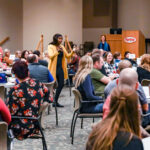Creative thinking is now the most sought after skill in the workforce, especially during this pandemic crisis. The main problem is people don’t truly understand creativity, how to identify it in applicants, and how to develop it within their current team members.
Research shows that it’s child-like curiosity and creative thinking that is the driving force of innovation and value creation.
Yep, it’s our children who we should be taking our creative thinking training courses from. That’s why I am now focused on this type of child-like inspired professional training for this new era.
These 💎 Diamond Tools of Creative Thinking, gathered from years of personal experience working with children and professional research, are the foundational areas of creative development that we have to intentionally sharpen for a well-equipped team of creative thinkers. The brightest creative adults employ these strategies that children exhibit so naturally, and they are here listed for you and your teams.

Our new definition of creativity is:
The process of problem finding and problem solving with relevance, value and novelty.
1) I Believe” (Foundational Beliefs Systems)
The first step is to believe you and your team can be creative and are capable of improving creative thinking abilities.
Have you ever heard this?
“Over here we have the creative team and over there we have the accountants.”
This type of differentiation always makes me shudder. Due to technological advancements in the fields of accounting, data analyses and other wrongly perceived ‘non-creative fields’,these professions are seeing the need to increase their creative thinking capacities with their employees.
Labeling certain groups or particular people as ‘creatives’ subconsciously communicates to other groups in your organization that they indeed are ‘not creative’. This is the quickest way to stamp out the creative potential of your team members.
The first step to improving your creative thinking and supporting this process within your organization is understanding what creativity is, know that it can be developed and believe YOU (and your colleagues) ARE CREATIVE!
2) Paying Attention Pays Off (Sensory Observation)
Creative thinking arises from knowledge. Through observation of the senses (sight, sound, taste, touch, smell) and cognition, you are able to increase the amount of data available for creative thinking. Senses become dulled from routine and cultural desensitization. Observe means ‘to attend to’. What are you giving your attention to? What do you notice? Engaging in sensory study strengthens your creative ability to see, hear, and feel what others are missing. Innovative ideas are produced from seeing what no one else sees and from connecting what no one else is connecting.
3) Return to Your ‘Wonder Years’ (Curiosity)
You arrived on Earth very curious but this vital skill for creative thinking lowers with familiarity and routine. Improve your desire see beyond convention. Change, improve, question things that everyone else accepts as the norm. Learn how to ask better questions and discover how the most awe inspiring ideas from the most mundane of objects. Get back to your wonder years.
4) Framing the Birds, Bears and Bugs! (Perspective/Reframing)
When looking at your organization, which view are you usually operating from? CEOs normally have the perspective of a bird’s eye view. Middle management has the viewpoint of a bear and entry-level employees are on the bottom rung with the bug’s life experience! It sounds funny, but know that every position is critical! When we shift from various perspectives of an experience, viewpoint, or event, it reveals new associations and insights about previously unchallenged concepts.
The TV show ‘Undercover Boss’ perfectly illustrates how a CEO, who goes undercover as an entry-level employee, gains new insight on improving operations because he changed his vantage point. Reframing situations and altering perspective add immensely to your creative thinking. Be a bird, a bear and even the oh so important beetle!
5) All the Feels (Emotional Intelligence/Empathy)
To think creatively is to engage your feelings through every process. Einstein understood this and claimed that our gut feelings are an “essential feature in productive thought.”
Sadly, we have lost our ability to truly feel, not only in social relationships but in our work. The skill of emotional intelligence is your ability to identify the emotional states of yourself, others and within situations. In order to successfully meet the needs of those you serve, the emotional skills of your team should regularly be trained and professionally developed. The better we do this, the more value we create. The more value we create, the more likely it is that our new ideas will have the impact that we desire.
6) A Creative ‘KISS’: Keep It Simple Silly! (Abstracting)
“If you can’t explain it to a 6-year old, you truly don’t know it yourself,” warned Albert Einstein. Even though he discovered the complex theory of relativity, he was very clear about being simple. We thrive off of making things convoluted. Why is this? To seem astute or important? The true sign of a creative thinker is one who has a talent for simplicity. Removing all the excess information and finding the pure nature of something (an object, concept or problem) is a creative Diamond Tool that allows you to extract the critical essence of the idea.
Your team members who can abstract by seeing through the complexity and discover the true essence of an issue shows true creative thinking. Like the other Diamond Tools, abstraction is a skill therefore it can be developed. Once learned well, this process will continue to reveal hidden truths within your organization’s processes, product development and vision goals.
7) Let’s Connect 4 (Making Connections)
Using your senses to see, feel, and explore connections between things that don’t initially have an apparent connection increases your ability to transfer insight from one experience to another. Finding ‘connection bridges’ between unlike items reveals critical elements that would otherwise go unnoticed. If the industrial era was about building things, this new creative era is about connecting things, people and ideas. Connect the unconnected and then go play Connect 4!
8) Purposeful Patterns (Pattern Recognition and Pattern Forming)
Patterns are all around us, in nature, in human interaction, even in the clickity-clack sounds of a subway train. Pattern recognition is dependent upon observation so when you are strengthening your senses, you’ll be surprised at the patterns that arise. You’ll then start to make deeper connections as well. Being able to prepare for the future is affected by your ability to perceive and make sense of patterns today.
9) The Function of Metaphorical Messages (Metaphors/Analogies)
“Conjunction-junction, what’s your function?” SchoolHouse ‘rocked’ us with that question decades ago but inquiring about the function of objects and comparing it to our own products and services turns out to be an essential act of creative thinking.
Author Keith Holyoak claimed that “the abilities to make analogies lies at the heart of human thinking. It truly lies at the heart of what it means to think creatively.”
Looking at the function of one thing and applying it to a function in our business can reveal truths that were previously hidden. It engages us to ask better questions after interacting with the analogy connection.
Creating metaphorical messages is one of the Diamond Tools used by all people in all walks of life. Metaphor allows us to move from the known into the unknown. Metaphorical training helps you see relationships and isn’t business all about relationships?
10) Diverse Demos (Diversity of Thought/People/Experiences)
Creative thinking training IS a part of diversity, equity and inclusion training. Idea inclusion is vital to the creative health of your organization. Don’t just invite diverse voices into your organization but also go out and interact with different people. Giving team members an opportunity to learn at various conferences, read books by diverse authors and connect with an array of thought leaders will enhance your in-house creative thinking sessions. External learning causes internal reflection. Diversify to intensify your organization’s creativity.
11) Play On! (Play/Imagination)
Bring play back! When you experiment in play without the fear of consequence, you are able to test, hypothesize, gain feedback and correct mistakes to gain a new perspective on how things work. It reveals new possibilities and transfers knowledge into real life applications. It isn’t just a great way to exercise the other Diamond Tools for discovery but it is indeed a tool itself.
12) Start With Art (Multi-Modal Communication/Proprioception)
The arts give us a deeper way to feel, forecast, communicate, investigate and explore the creative Diamond Tools. In Adam’s Grant’s book, Originals, he argues that many of our most revered scientists, writers and entrepreneurs have a background in the arts. He claims, “People who are open to new ways of looking at business and science also tend to be fascinated with the expression of ideas and emotion through images, sounds and words. They see the arts as a powerful source of insight.” It’s this insight that can increase creative thinking and convert those ideas into value – both for the team member and the organization.
13) I Like To Move It, Move It! (Transference/Transforming/Translation)
Highly creative people can also communicate ideas through multiple forms. Ask your team to freeze in a pose that communicates your company’s vision statement. Then have them sketch a picture that communicates the same idea. Next, have them find an instrumental song that communicates that same concept. Throughout these tasks, they must think deeply about the vision of your organization and how to best relay those abstract concepts. Dance your mission. Act out your customer’s pain points. Sing your goals.
Transferring concepts and translating ideas from one medium uncovers key insights while strengthening your ability to communicate those ideas clearly and concisely. Creative people can create in one mode, define the problem in another mode, and then solve it and express it through other mediums. So go ahead and move it, move it!
14) Divine Downloads (Intuition/6th Sense/8th Arrow)
The greatest creative thinkers sometimes admit to an ‘outside force’ that seems to deliver creative ideas. Whether you label this inspiration the Divine, the Universe, or the 8th arrow, being open to external inspiration will enhance your internal intuition. Record those ‘aha’ moments!
15) Better Together (Synthesizing)
Ultimately, whole-brain thinkers are the most creative thinkers. Incorporating all of these tools to reveal ‘the wholeness’ of the idea or solution is the critical step to creativity and innovation. The whole is greater than its parts and being able to synthesize all of the data with the use of these Diamond Tools, will produce those breakthrough ideas you’re looking for.
You need team members that can synthesize. As we witnessed with the onset of this pandemic, no major crisis facing this world can be solved within one discipline, one method or within silos. Innovation and value production is always transdisciplinary and multimodal. We, when using these Diamond Tools, work better together!
16) Courage (Conative Execution)
Creative courage is the new currency. The new is unknown. The new is scary. With our future rapidly changing due to the advancement of technology and this pandemic, the element of courage is non-negotiable. Creative people can produce new ideas but those ideas need to be shared. The best ideas need action and strategy to head into the market. It’s never just the idea, it’s also the execution.
Highly creative people see themselves as pioneers because novel ideas can lead them into new territory. Having the confidence to push past conventional thinking, apply these Diamond Tools in your business and share your creative ideas takes courage. Many ideas die within the creator because of fear. How many ideas have died within your organization? How much value has been lost? No one will ever know.
Building courage is a skill. Training in this area will help team members develop confidence throughout their creative thinking process. Allow them to build the courage to create, contribute and make an impact for your clients and communities!
Retooling With Diamonds for a New Era
5, 4, 3, 2, 1 HAPPY NEW YEAR!!! 2020!!!
As we were counting down the new year in December of 2019, many people had no idea that 2020 would reveal a permanent shift in the way we interact, the way we do business and the way we educate our students and retool our workforce. Creative thinkers knew a change was coming but no one predicted it to this magnitude. This pandemic brought a shift that will forever change the way we create value in the market place. These Diamond Creative Thinking Tools will help break barriers that block creative thinking and restore our natural ability to make connections and be inventive with our ideas. The time is now.




